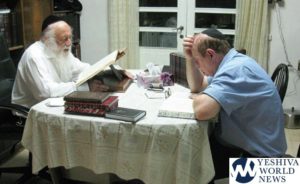A painful defeat was suffered by the chareidi community in the mayoral elections in Yerushalayim, with Mayor-elect Nir Barkat taking City Hall by 19,000 votes, defeating United Torah Judaism candidate Meir Porush. Despite the defeat, UTJ remains a prominent member of the Jerusalem City Council, actually the largest party on the council. Nevertheless, the party’s numbers dropped from nine to eight seats. In total, the Jerusalem mayoral race pulled 221,713 votes out of 527,672 eligible voters. The mayor-elect received 112,604 votes (52.44%), Meir Porush 93,257 (43.43%), Arkadi Gaydamak 7,789 (3.63%), Dan Biron 1,087 (0.5%). The numbers are based on final results from 704 of the 707 polling stations in the capital, not including the votes of the soldiers. In the previous election, in which Mayor Uri Lupoliansky was elected, he received 90,090 votes (51.64%) and Nir Barkat received 74,550 (42.73%). A quick analysis of the numbers shows Rav Lupoliansky received 21,468 votes more than the number of registered voters in the UTJ and Shas parties, as compared to Rav Porush who received 9,883 additional votes. This would reflect that there was a drop among the general, dati leumi and traditional voters, 12,000 fewer votes. As was predicted, a significantly larger turnout was seen among the non-frum voters. In the Lupoliansky election, voter turnout was reported at 38% but in this week’s mayoral race, that number exceeded 42%. The 4% difference represents some 20,000 voters, or three mandates based on the approximately 7,000 votes required per seat. As a result, UTJ’s voice on the city council dropped from 9 to 8 seats, Shas from 5 to 4 and the dati leumi voice from 4 to 3. The three council seats lost among the Shomer Shabbos parties went to the secular parties. UTJ however did accomplish something, earning 53,550 votes in the election as compared to 43,097 in the Lupoliansky election, approximately a 24% increase, representing the continued growth of the chareidi community in the capital. The lost city council seat is the result of the increase in the total number of voters, resulting in UTJ’s relative decline in influence on the council, the city’s governing board. The mayor-elect’s Jerusalem Will Succeed Party earned six seats, the same as in the current administration. Avigdor Lieberman’s Yisrael Beitenu Party earned 2 seats for a first time, and Likud fell from 2 to 1 seat. Three new local lists also succeeded in entering the council, “Awakening” (2), For the Sake of Yerushalayim (1), and Pisgat Ze’ev (1). There is still a possibility for change after the tabulation of votes from IDF soldiers. The head of the Degel list in Yerushalayim, Yitzchak Pindrus announced the list has been presented to Gedolei Hador Shlita, expressing confidence that the representatives will be privileged to work on behalf of the sanctity of Yerushalayim and the Bnei Torah community in the capital. (Yechiel Spira – YWN Israel)






